Research on state management for community-based tourism development in some Northwestern provinces of Vietnam
Abstract: Community based tourism (CBT) development is a topic that is currently of interest to many researchers and managers. In Vietnam, CBT was developed many years ago and
has been increasingly encouraged to develop. In that context, the study of state management
for community-based tourism development, especially at the provincial level, has a very important significance. Although there have been some domestic and foreign studies on this topic,
however, so far, there has been no comprehensive study on state management activities for CBT
development in the North-western region. The objective of the paper is to propose a number of
solutions to improve the state management of CBT development in some Northwestern provinces on the basis of analyzing the current state of CBT development management. Proposed solutions are related to reforming the formulation of strategies, planning, CBT development plans;
perfecting policies, regulations related to CBT development, and strengthening the inspection,
examination of CBT development activities.
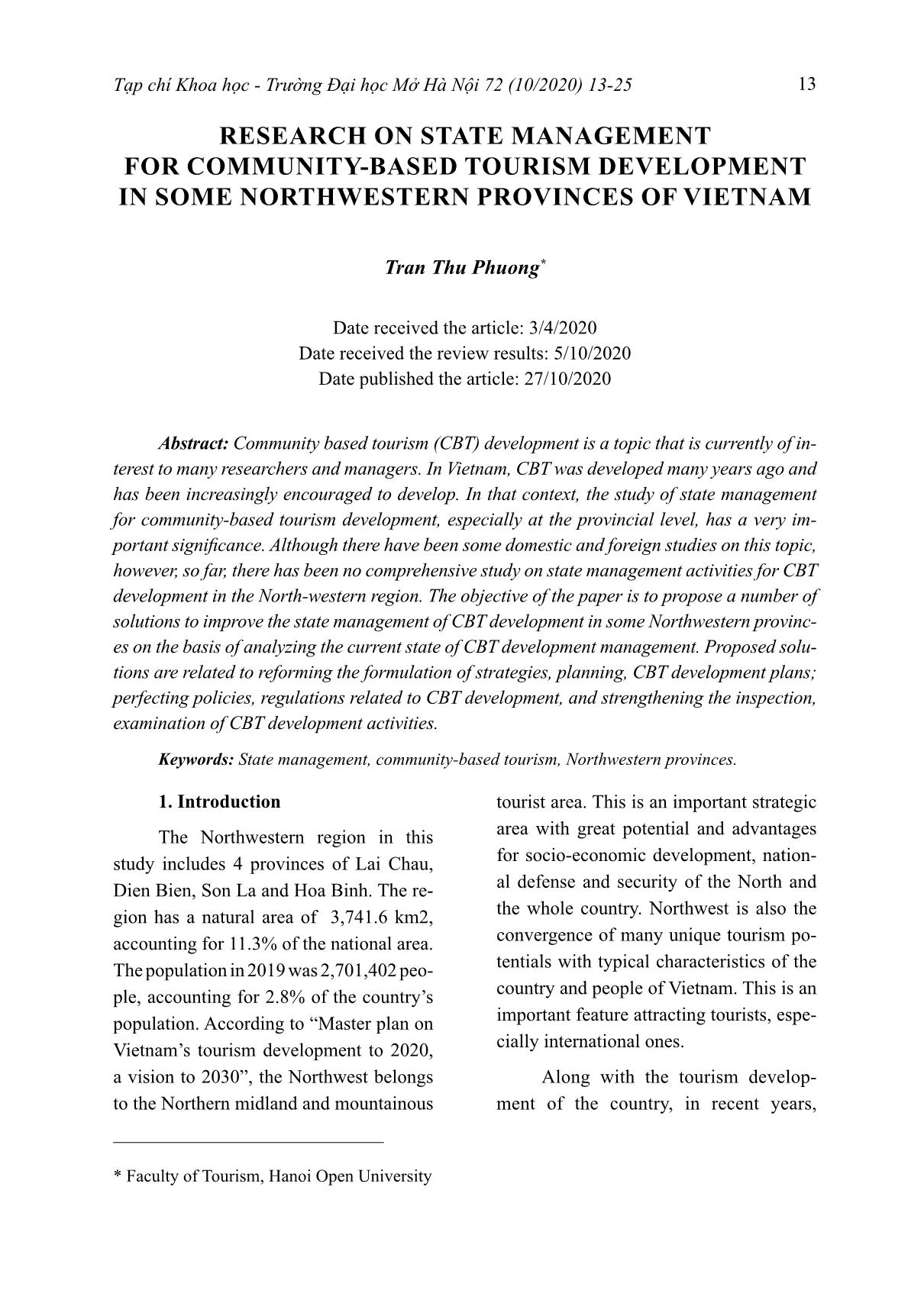
Trang 1
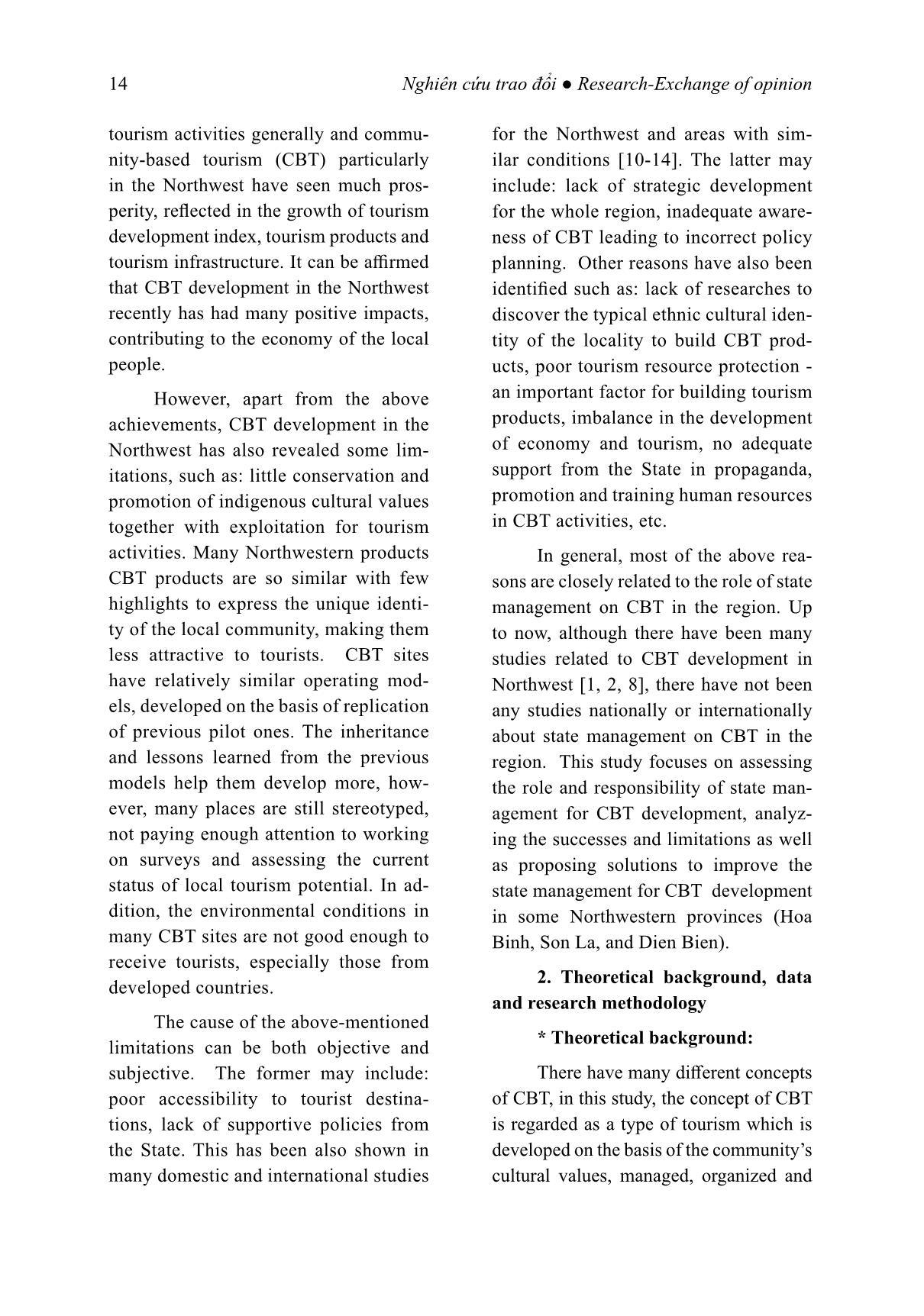
Trang 2
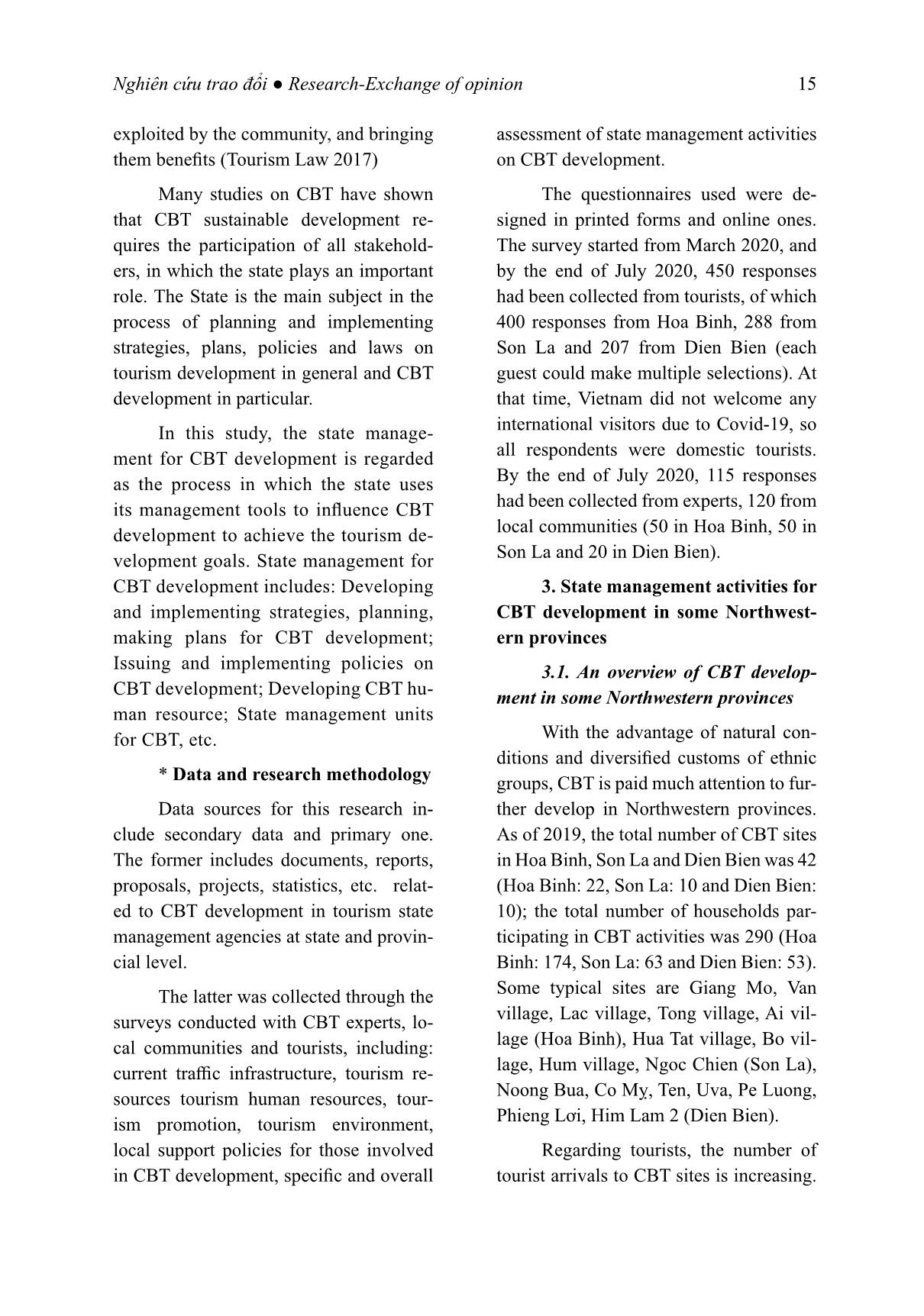
Trang 3
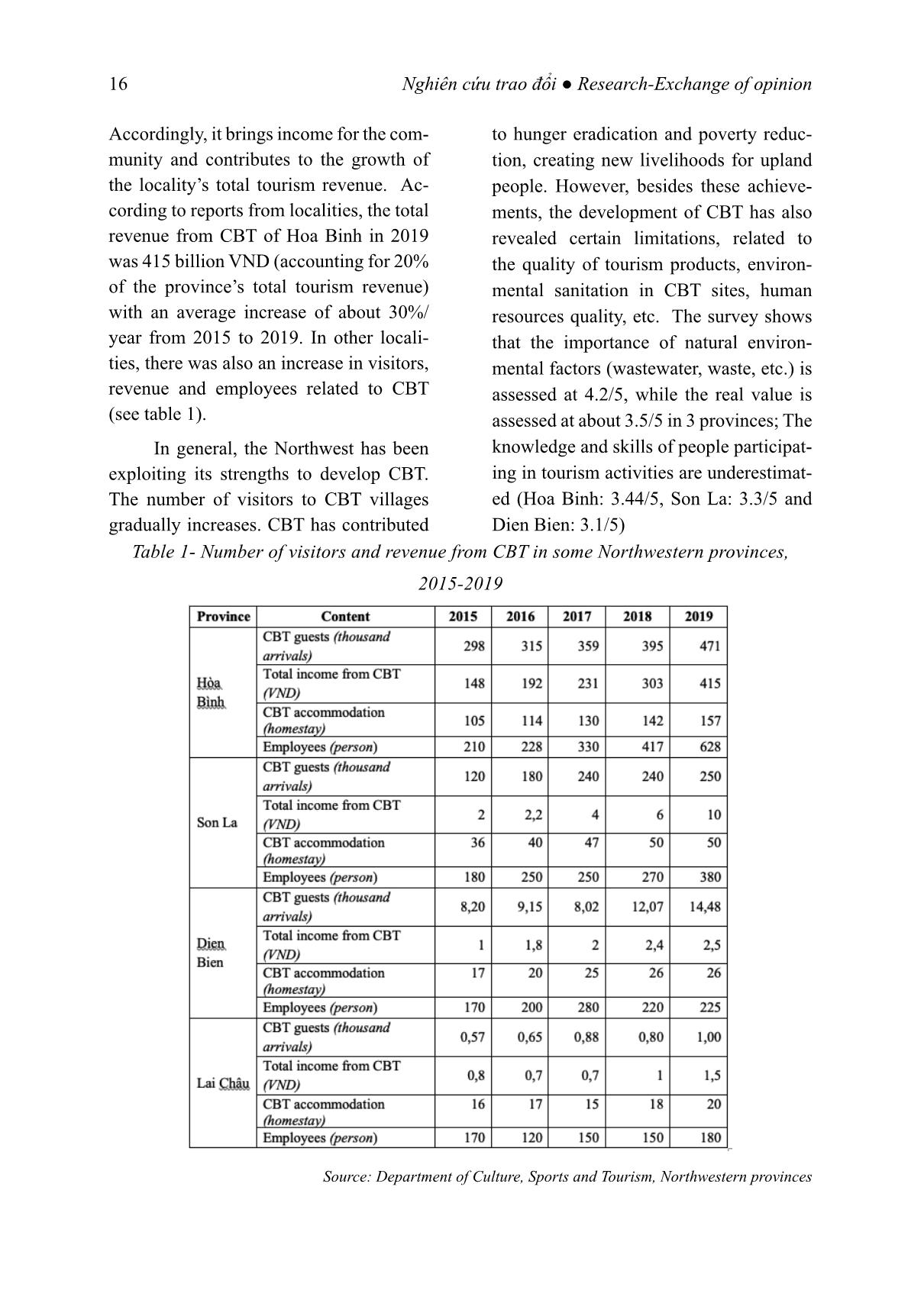
Trang 4
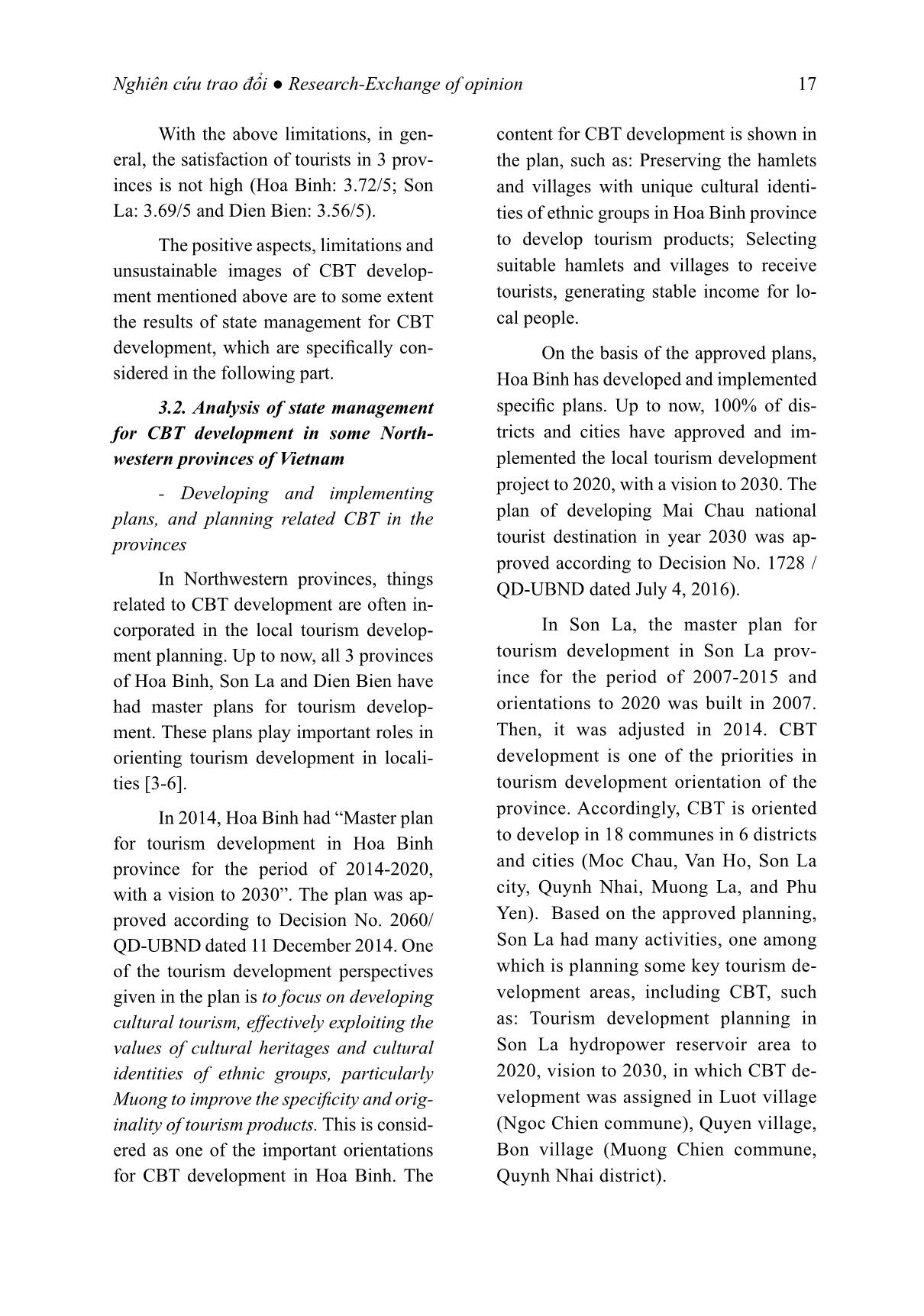
Trang 5
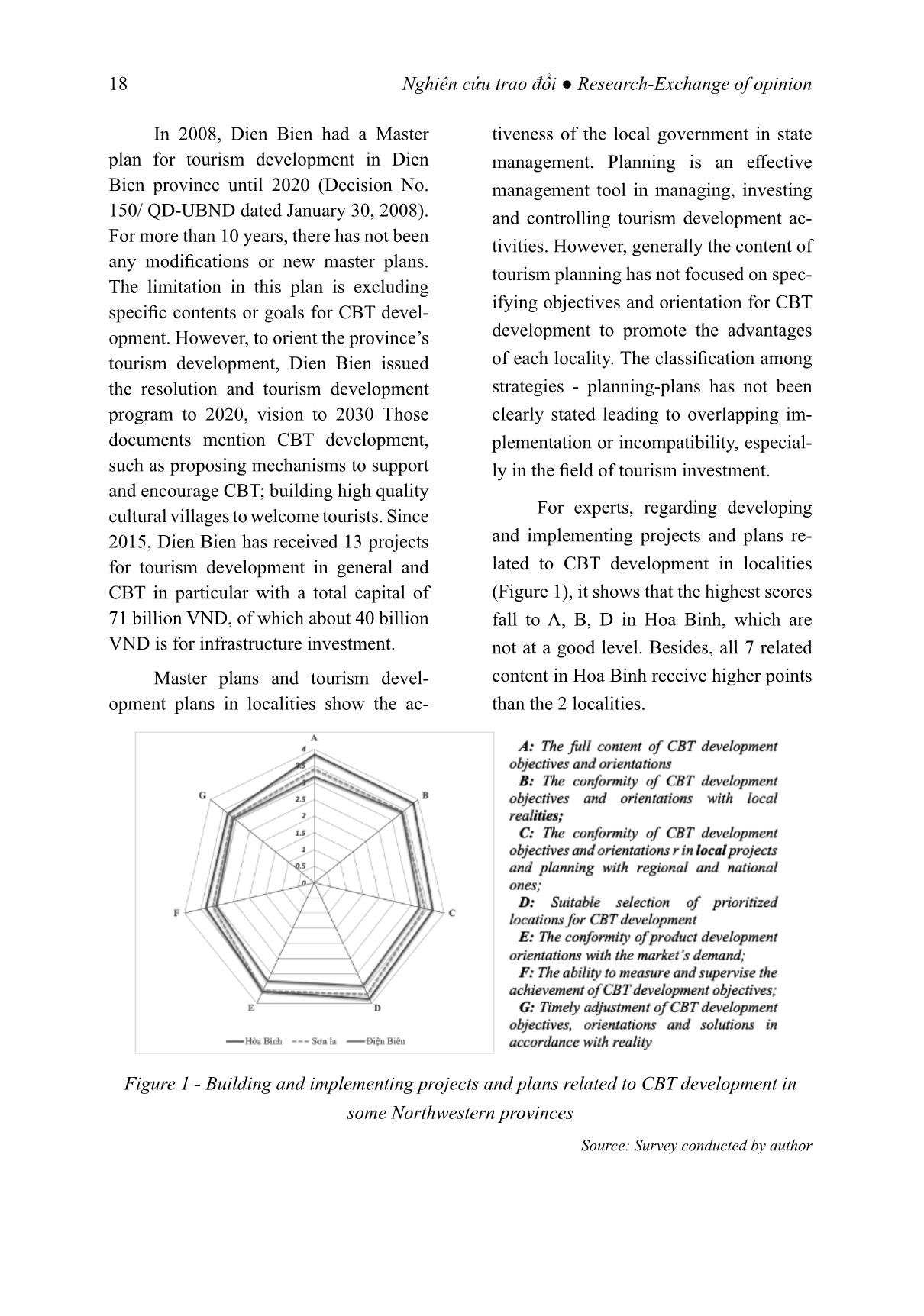
Trang 6
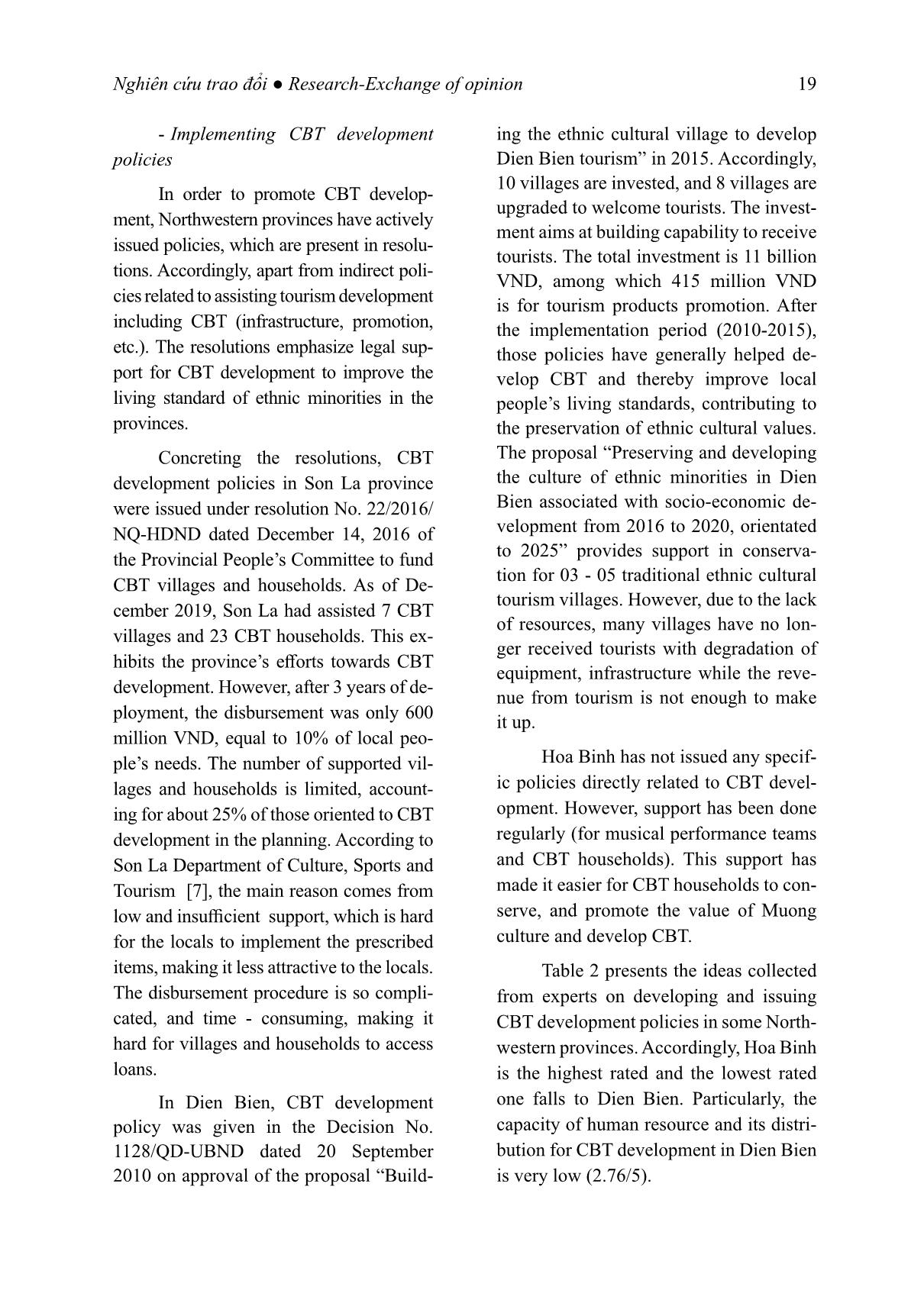
Trang 7
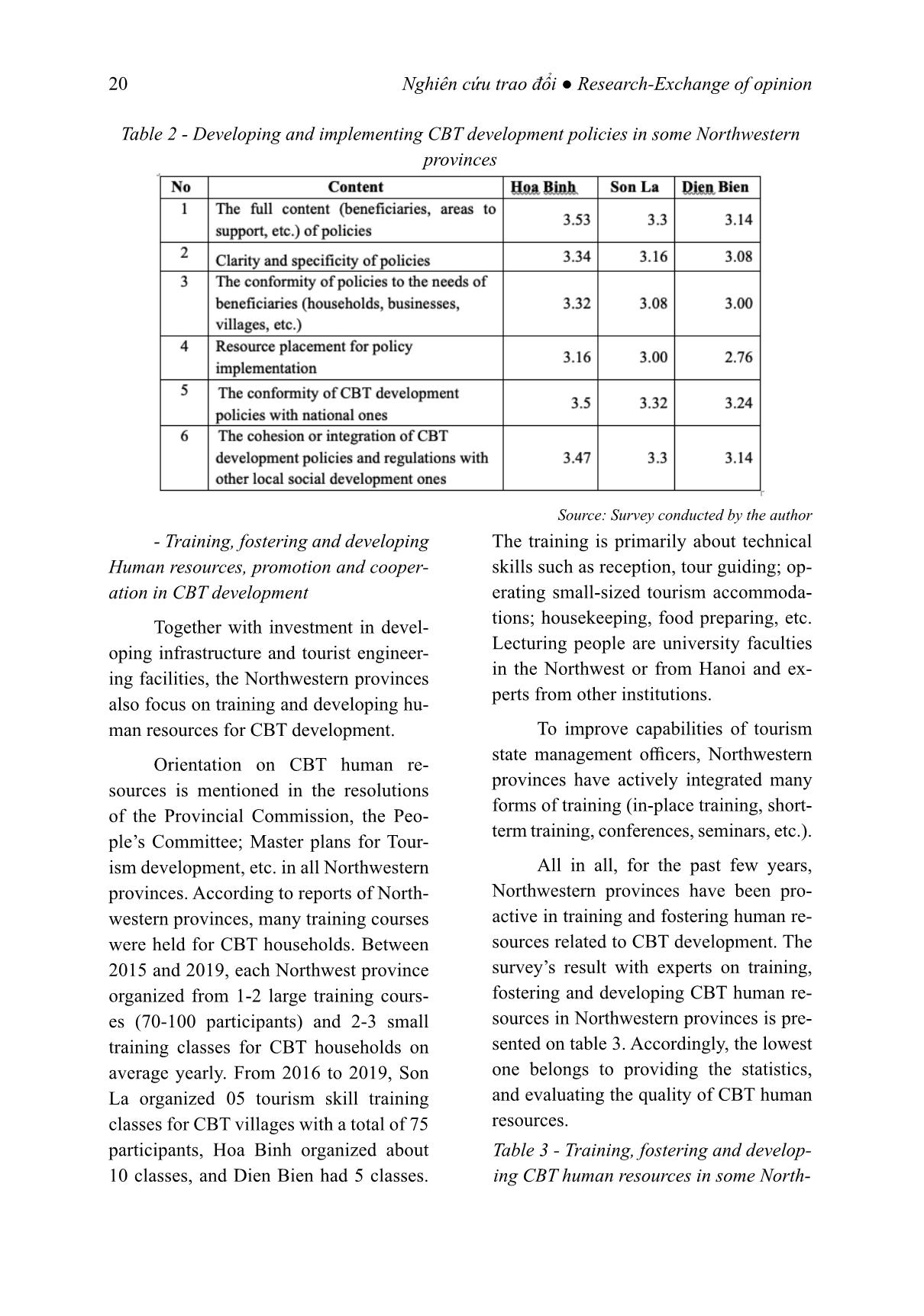
Trang 8
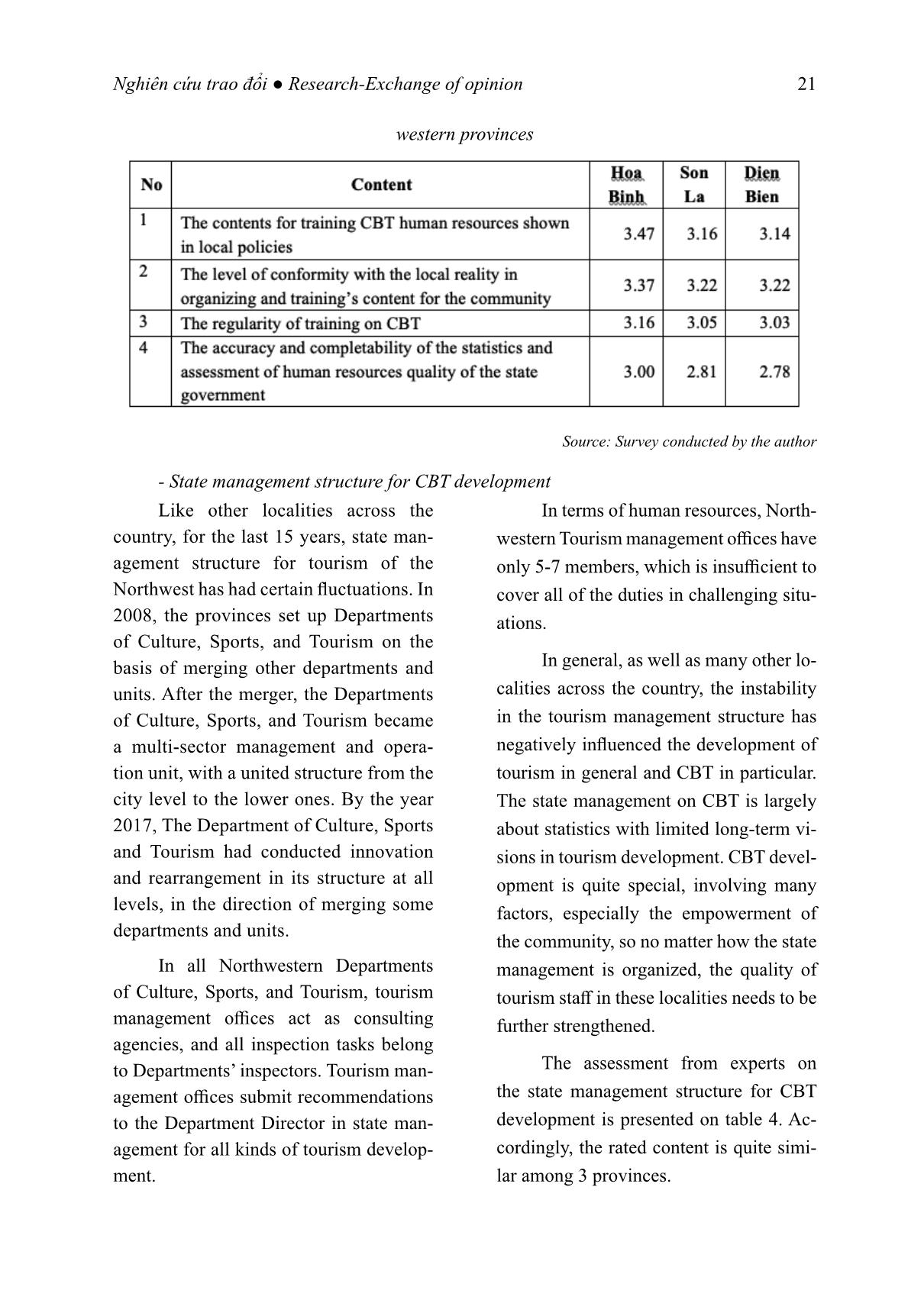
Trang 9
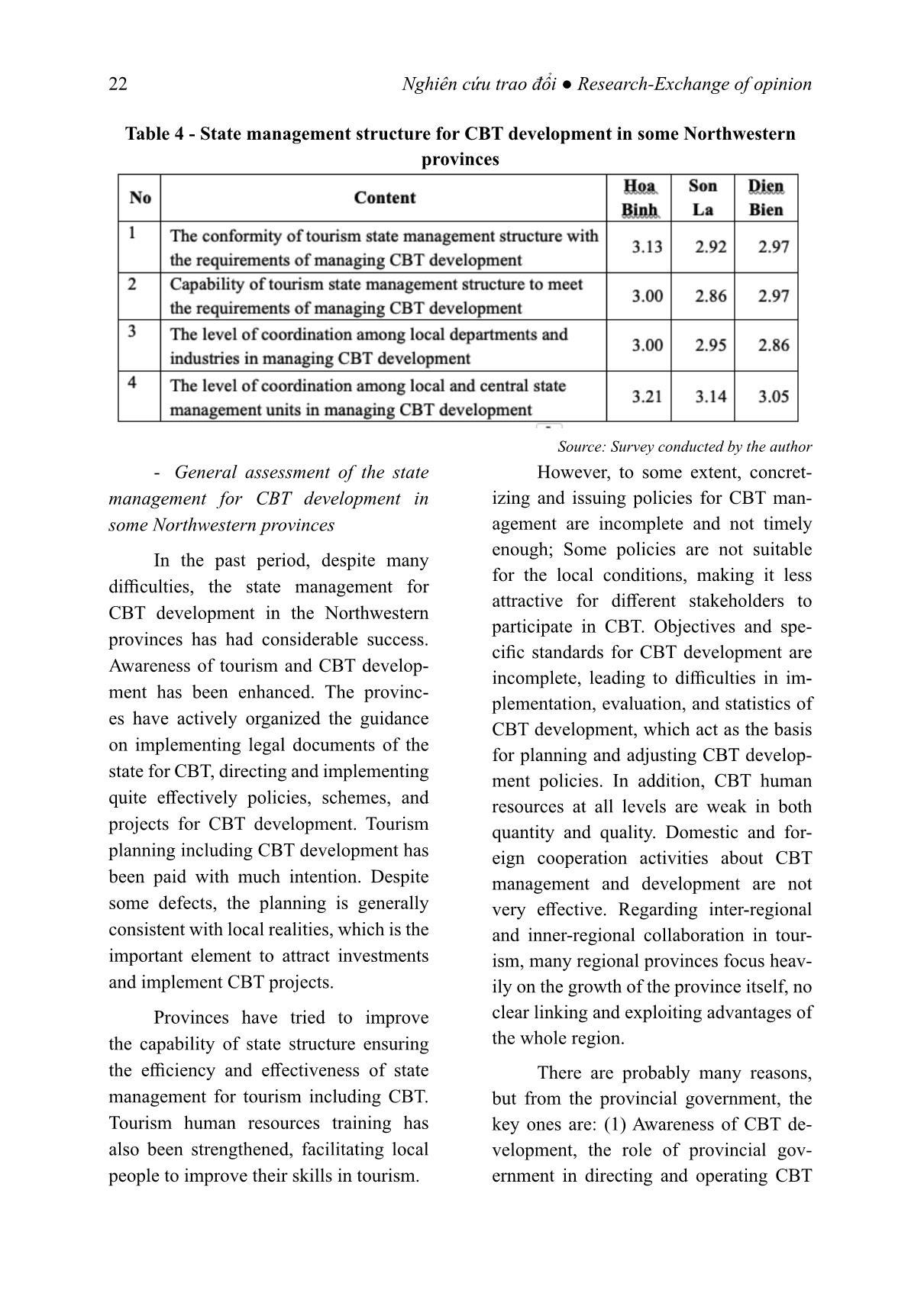
Trang 10
Tải về để xem bản đầy đủ
Tóm tắt nội dung tài liệu: Research on state management for community-based tourism development in some Northwestern provinces of Vietnam
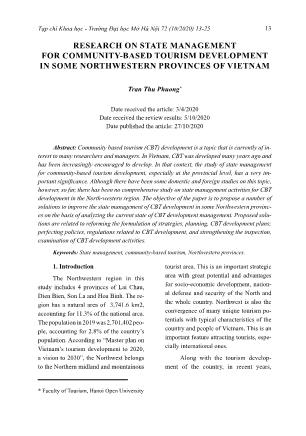
rticipants) and 2-3 small training classes for CBT households on average yearly. From 2016 to 2019, Son La organized 05 tourism skill training classes for CBT villages with a total of 75 participants, Hoa Binh organized about 10 classes, and Dien Bien had 5 classes. The training is primarily about technical skills such as reception, tour guiding; op- erating small-sized tourism accommoda- tions; housekeeping, food preparing, etc. Lecturing people are university faculties in the Northwest or from Hanoi and ex- perts from other institutions. To improve capabilities of tourism state management offi cers, Northwestern provinces have actively integrated many forms of training (in-place training, short- term training, conferences, seminars, etc.). All in all, for the past few years, Northwestern provinces have been pro- active in training and fostering human re- sources related to CBT development. The survey’s result with experts on training, fostering and developing CBT human re- sources in Northwestern provinces is pre- sented on table 3. Accordingly, the lowest one belongs to providing the statistics, and evaluating the quality of CBT human resources. Table 3 - Training, fostering and develop- ing CBT human resources in some North- 21Nghiên cứu trao đổi ● Research-Exchange of opinion western provinces Source: Survey conducted by the author - State management structure for CBT development Like other localities across the country, for the last 15 years, state man- agement structure for tourism of the Northwest has had certain fl uctuations. In 2008, the provinces set up Departments of Culture, Sports, and Tourism on the basis of merging other departments and units. After the merger, the Departments of Culture, Sports, and Tourism became a multi-sector management and opera- tion unit, with a united structure from the city level to the lower ones. By the year 2017, The Department of Culture, Sports and Tourism had conducted innovation and rearrangement in its structure at all levels, in the direction of merging some departments and units. In all Northwestern Departments of Culture, Sports, and Tourism, tourism management offi ces act as consulting agencies, and all inspection tasks belong to Departments’ inspectors. Tourism man- agement offi ces submit recommendations to the Department Director in state man- agement for all kinds of tourism develop- ment. In terms of human resources, North- western Tourism management offi ces have only 5-7 members, which is insuffi cient to cover all of the duties in challenging situ- ations. In general, as well as many other lo- calities across the country, the instability in the tourism management structure has negatively infl uenced the development of tourism in general and CBT in particular. The state management on CBT is largely about statistics with limited long-term vi- sions in tourism development. CBT devel- opment is quite special, involving many factors, especially the empowerment of the community, so no matter how the state management is organized, the quality of tourism staff in these localities needs to be further strengthened. The assessment from experts on the state management structure for CBT development is presented on table 4. Ac- cordingly, the rated content is quite simi- lar among 3 provinces. 22 Nghiên cứu trao đổi ● Research-Exchange of opinion Table 4 - State management structure for CBT development in some Northwestern provinces Source: Survey conducted by the author - General assessment of the state management for CBT development in some Northwestern provinces In the past period, despite many diffi culties, the state management for CBT development in the Northwestern provinces has had considerable success. Awareness of tourism and CBT develop- ment has been enhanced. The provinc- es have actively organized the guidance on implementing legal documents of the state for CBT, directing and implementing quite eff ectively policies, schemes, and projects for CBT development. Tourism planning including CBT development has been paid with much intention. Despite some defects, the planning is generally consistent with local realities, which is the important element to attract investments and implement CBT projects. Provinces have tried to improve the capability of state structure ensuring the effi ciency and eff ectiveness of state management for tourism including CBT. Tourism human resources training has also been strengthened, facilitating local people to improve their skills in tourism. However, to some extent, concret- izing and issuing policies for CBT man- agement are incomplete and not timely enough; Some policies are not suitable for the local conditions, making it less attractive for diff erent stakeholders to participate in CBT. Objectives and spe- cifi c standards for CBT development are incomplete, leading to diffi culties in im- plementation, evaluation, and statistics of CBT development, which act as the basis for planning and adjusting CBT develop- ment policies. In addition, CBT human resources at all levels are weak in both quantity and quality. Domestic and for- eign cooperation activities about CBT management and development are not very eff ective. Regarding inter-regional and inner-regional collaboration in tour- ism, many regional provinces focus heav- ily on the growth of the province itself, no clear linking and exploiting advantages of the whole region. There are probably many reasons, but from the provincial government, the key ones are: (1) Awareness of CBT de- velopment, the role of provincial gov- ernment in directing and operating CBT 23Nghiên cứu trao đổi ● Research-Exchange of opinion development is incomplete; (2) Coordi- nation among sectors, agencies and de- partments in localities in developing and managing projects, planning related to CBT; Developing and allocating invest- ment resources; Checking and evaluating policies related to CBT development are not strict enough to utilize the strengths of each body in developing and imple- menting CBT projects, and planning (3) The lack of eff ective coordination among Northwestern provincial governments in managing tourism and CBT development leads to overlapped investment, ineff ec- tiveness and failure in promoting the strengths of each province. 4. Solutions to improve state man- agement for CBT development in some Northwestern provinces of Vietnam On the basis of Tourism Law 2017, Vietnam tourism development strategy to 2030, Master plan for tourism develop- ment in Vietnam to 2020 - vision to 2030, CBT and tourism development orienta- tions, and real conditions in Northwestern provinces, the following solutions should be applied for those provinces to develop CBT, and gradually overcome the weak- nesses in CBT and tourism state manage- ment: Firstly, in terms of viewpoints: 1) Improving state management for CBT development is associated with improv- ing awareness and cognition on the role of CBT to local tourism development; 2) Improving state management for CBT de- velopment is to optimally exploit tourism potential, promote CBT development sus- tainably contributing to life improvement, poverty alleviation and socio-economy development of localities in particular and in the Northwest in general; 3) Improving state management for CBT development is to improve its eff ectiveness and effi - ciency in view of the fact that Vietnam tourism is oriented to become a leading economic sector, and the industrial revo- lution 4.0 is spreading; 4) Improving state management for CBT development must be based on experience in Vietnam and in the world. Secondly, continuing to raise aware- ness of all stakeholders in tourism activi- ties, including the local community about CBT development; Emphasizing their awareness about CBT’s role in enhancing people’s lives, protecting the local cultural values from the negative impacts of tour- ism. Third ly, improving planning and proposals related to CBT development in association with changes in their content and implementation methods; Reviewing, developing or adjusting planning and pro- posals must ensure the principles of CBT development, being in line with the mar- ket’s demands, CBT development trend, and local features. Fourthly, reviewing, and improv- ing CBT development policies and regu- lations in accordance with local realities, ensuring sustainable CBT development; Integrating CBT development regulations and policies with those on new rural de- velopment and others; Focusing on as- sessing the impact of CBT development assistance policies and regulations to make them suitable with local features. Fifthly, strengthening tourism plan- ning management, investing in tourism in- 24 Nghiên cứu trao đổi ● Research-Exchange of opinion frastructure; facilitating in terms of mech- anism and policies to attract investment for CBT development in the province; Sixthly, focusing on investment in improving CBT service quality at CBT sites; Strictly managing tourism resources, developing detailed planning and plans, ensuring the formation and exploitation of tourism products (reasonable, unique), improving the value of CBT products to create the competitive advantage. Seventhly, improving tourism pro- motion, tied to the market, strengthening the connection among Northwest prov- inces in promoting tourism generally and CBT particularly. Eighthly, continuing to improve state management structure for tourism and CBT development in Northwest to strengthen its eff ectiveness and effi cien- cy; Training human resources in tourism and CBT management responding to the new demand; Continuing reviewing and implementing policies related to training, fostering and developing CBT human re- sources to improve its quality. 5. Conclusion Improving state management for CBT development is an important re- quirement to improve the effi ciency of CBT development in the market economy and international integration. The article analyzed the current status of state man- agement for CBT development and pro- posed a number of solutions to improve it in some provinces in the Northwestern region. Proposed solutions include: in- novating strategic planning, tourism de- velopment plan in general and CBT de- velopment in particular; improving CBT development policies, and regulations; strengthening inspection, supervision and violations handling in CBT development, etc. These solutions need to be done in sync and divided into stages. CBT devel- opment is considered to be suitable with social trends, meeting the needs of tour- ists to explore the unique ethnic culture. However, for CBT development, besides strengthening the eff ectiveness and effi - ciency of state management, the commu- nity should be aware of its role and respon- sibilities when participating in tourism activities. Apart from that, the community must be together with state management units protecting indigenous culture - the core values of the community, because if these values are not protected, we cannot develop CBT properly and sustainably. Reference: 1. ADB - Asian Development Bank (2003), Serving and Maintaining: Improving public administration in a competitive world, Na- tional politics Publisher, Hanoi. 2. Do Thuy Mui (2016), Potential for sustain- able development of community based tour- ism in the Northwest: Current situation and solutions, Tay Bac University. 3. Khuong Thi Hong Nhung (2016), Imple- menting policies of sustainable tourism de- velopment, case study in Hoa Binh province, Master’s thesis, Academy of Social Sciences. 4. Dien Bien Department of Culture, Sports and Tourism (2008), Master plan on tourism development of Dien Bien province in the pe- riod to 2020. 5. Hoa Binh Department of Culture, Sports and Tourism (2014), Master plan on tourism development of Hoa Binh province for the pe- riod 2014-2020, a vision to 2030. 25Nghiên cứu trao đổi ● Research-Exchange of opinion 6. Hoa Binh Department of Culture, Sports and Tourism (2017), Orientations and solu- tions to build and develop sustainably the community-based tourism in the Northwest. 7. Son La Department of Culture, Sports and Tourism (2014), Adjusting the master plan for tourism development in Son La province to 2020, a vision to 2030. 8. Son La Department of Culture, Sports and Tourism (2019), Report on the results of com- munity-based tourism development policies and orientations in Son La province to 2020. 9. Institute for Tourism development and re- search (2018), Community-based tourism development policies and human resource training for community-based tourism devel- opment in Vietnam, Workshop proceedings, Mai Chau, Hoa Binh. 10. Tek B. Dangi và Tazim Jamal (2016), “An integrated approach to “sustainable commu- nity-based tourism””, Sustainability (Switzer- land). 8. 11. Amman Abd Ghapar, Nor Ain Othman và Salamiah Jamal (2015), “The Role of Govern- ment on Community Resilient in the Homestay Industry in Malaysia”, Tourism, Leisure and Global Change. 2, tr. 8-10. 12. Andrea Giampiccoli, Sean Jugmohan và Oliver Mtapuri (2015), “Characteristics and Policies of Community- Based Tourism in the Case of Jamaica”, tr. 45-70. 13. Sharon Harwood (2010), “Planning for Community Based Tourism in a Remote Loca- tion”, Sustainability. 2, tr. 1909-1923. 14. Ministry Of Tourism and Entertainment - Jamaica (2015), National Community Tourism Policy and Strategy, chủ biên. 9. Tourism Development Research Institute (2018), policy on development of Community tourism and human resource training for the development of Community tourism in Viet- nam., Seminar Proceedings, Mai Chau, Hoa Binh. 10. Tek B. Dangi và Tazim Jamal (2016), “An integrated approach to “sustainable commu- nity-based tourism””, Sustainability (Switzer- land). 8. 11. Amman Abd Ghapar, Nor Ain Othman và Salamiah Jamal (2015), “The Role of Govern- ment on Community Resilient in the Homestay Industry in Malaysia”, Tourism, Leisure and Global Change. 2, tr. 8-10. 12. Andrea Giampiccoli, Sean Jugmohan và Oliver Mtapuri (2015), “Characteristics and Policies of Community- Based Tourism in the Case of Jamaica”, tr. 45-70. 13. Sharon Harwood (2010), “Planning for Community Based Tourism in a Remote Loca- tion”, Sustainability. 2, tr. 1909-1923. 14. Ministry of Tourism and Entertainment - Jamaica (2015), National Community Tourism Policy and Strategy. Author address: Faculty of Tourism - Hanoi Open University Email : phuongtt@hou. edu.vn
File đính kèm:
 research_on_state_management_for_community_based_tourism_dev.pdf
research_on_state_management_for_community_based_tourism_dev.pdf

